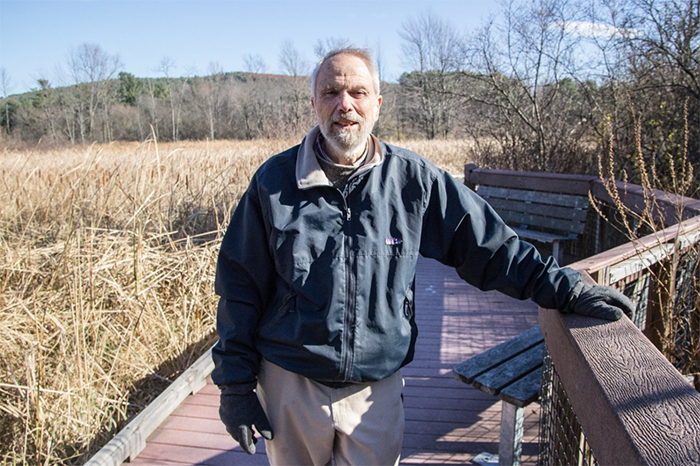By Yvette Shi, Addison Independent
MIDDLEBURY — Facing President Donald Trump’s agressive agenda against environmental policies, it’s fitting the Vermont Natural Resources Council honored Ripton resident Warren King for his lifetime of environmental stewardship this past Thursday.
King, whose career has spanned the globe, now heralds action at the local level as the best course under the current administration.
King moved to Vermont in 1989, when the bottle bill passed — an effort led, in part, by one of the state’s leading legislators, Republican Sen. Arthur Gibb, most popularly known as the author of Act 250. King embraced Sen. Gibb’s effort, and though a newcomer to town, felt it was time for Ripton to have a recycling facility and presented the selectboard with the idea. Within a year the center was up and running.
On Thursday, in a presentation that shone a spotlight on King’s two decades of community service, King was presented the Arthur Gibb Award for Individual Leadership for his outstanding “leadership, commitment to public service, vision, creativity, ability to balance competing interests, integrity and humility.”
At a packed house at Middlebury College’s Kirk Alumni Center, VNRC Executive Director Brian Shupe noted the disruptive times the nation is facing under Trump, but also the growing importance of the work being done in Vermont and at the local level.
“What’s happening in Washington, D.C. is really, really dangerous to this country, this world and for Vermont, and our work has never been more important than it is now,” Shupe told the crowd of about 150. “More and more people are turning to all of the states to make progress and defend themselves against federal actions… We think that Vermont can be a real beacon for other states in making progress on important issues.”
Environmental activist, author and Ripton resident Bill McKibben said he was privileged to introduce King and highlight King’s environmental stewardship, but first noted the climate crisis the world faces and the lack of American leadership at precisely the wrong time.
“This is the first fully global crisis that there’s ever been, and it would make a great deal of sense if we were addressing it at a global level,” said Bill McKibben, citing a litany of damaging actions the Trump administration has taken in the past eight months.
McKibben said the White House administration was undoing decades of environmental protections long supported by both political parties, and echoed Shupe’s view that the battle during the next few years may best be fought at the local level.
Citing King’s numerous contributions in Ripton and his uncanny ability to rally the community around issues that needed to be tackled, McKibben summed up the impact of King’s influence in his community: “The result (of all King’s work) is that the physical characteristics of Ripton represent Warren’s vision of what things should be,” said McKibben, who has been King’s neighbor and friend for much of the past 17 years.
McKibben said he witnessed King constantly engaging in local work, getting out early in the morning and staying out late for meetings at night. Such dedication to local and global causes, McKibben said, make King and his wife, Barry, the “Addison County model of what responsible citizenship is about.”
McKibben, who has been a tireless advocate on climate initiatives since his sentinel book The End of Naturein 1989, reflected on his own work and King’s influence. When he occasionally gets weary of the battle, McKibben admitted, “I think of Warren,” and be reinvigorated.

RIPTON RESIDENT WARREN King, center, was awarded the VNRC’s Arthur Gibb Award at its annual meeting Thursday night at the Kirk Alumni Center. Environmental leader Bill McKibben, a friend and neighbor, introduced King. VNRC Executive Director Brian Shupe is at right.
“And I know why, in the end, he does the work of citizenship,” McKibben said. “It’s because… of his deep and strong attachment to the natural world around us.” Every great environmental activist he has known, McKibben said, has that strong connection to nature.
EXPANSIVE CAREER
King’s career and life as an environmentalist is extensive.
He served as executive assistant of the Smithsonian’s Institution’s International Council for Bird Preservation from 1971-1976, and chaired the U.S. section of the council from 1976-1985. During that time, he was in charge of drafting a second edition in 1981 of the council’s Bird Red Data Book, which inventoried the world’s endangered bird species.
His Smithsonian duties often took him far away from an office desk.
“I started out with (the Smithsonian) working on a seabird ecology project in the tropical Pacific,” King recalled. “I didn’t have anything better to do with my life and thought, ‘This is going to be great.’ I went to a lot of islands you can’t get to. It was among the most memorable times of my life.”
King and his colleagues canvassed the waters around Hawaii, south to Phoenix Island and Christmas Island.
“I’ve always been intrigued by rarity, especially with birds, but in the past 12 years, with plants,” King said. “I’ve worked as a plant conservation volunteer, and have enjoyed that immensely. The nice thing for me is that you can do it in your own time and in your own community.”
He has been tracking two rare species for the New England Wildflower Society. The first is a crop of Jacob’s Ladder, a plant that produces cup-shaped, lavender-colored or white flowers. King has found examples of Jacob’s Ladder growing in parts of Ripton, Lincoln and South Starksboro. He is also monitoring the Large Whorled Pagonia, a rare orchid in Salisbury.
King, now 80, still makes regular jaunts to check on the health and spread of his horticultural charges, and report on their progress.
King’s résumé, among many other accomplishments, includes:
• Serving on the Ripton Planning Commission since 1993, presiding as its chairman since 2002; creating the Ripton Conservation Commission in 1994; starting Ripton’s recycling program in 1990, serving as its coordinator ever since; serving as a Moosalamoo Association board member; serving as Ripton’s Green-Up Day coordinator since 1989 and its energy coordinator since 2008.
King also had a brief career as a racecar driver, during which he won the 1961 Grand Prix of the Yukon, and he was awarded the Otter Creek Audubon Society’s Silver Feather Award in 2016.
A LOCAL FOCUS
It is no surprise that King considers community involvement among the highest of callings, nor that he has embraced Ripton and Vermont as home.
“I think there’s no state in the union which has such a need for strong community as Vermont, because everything happens at the community level,” King said. “We hear about the governor and the Legislature, but really it’s at the community level that everything goes on -— and that makes a difference in how you live.”
“So I think that the local approach is certainly the best solution we can offer at the moment to the country’s problems and the world’s problems,” King said. “As long as we can keep the community spirit, we will be heading in the right direction.”
John Flowers contributed to this report.





